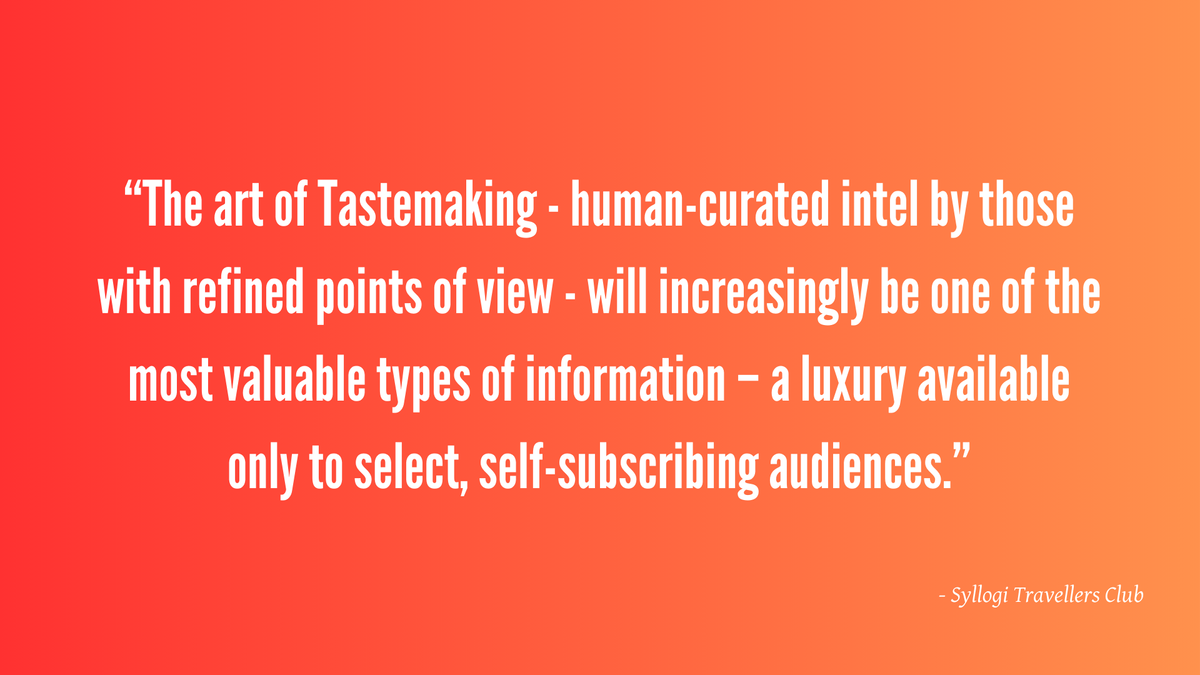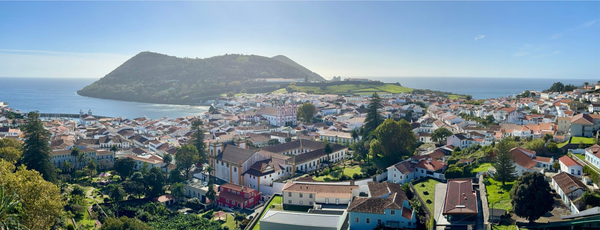Contemplate: Tastemakers and the Rise of Members-Only
Authentic taste - a future luxury for those overwhelmed by internet search

By Erin Washington and Gray Shealy
Part One of a series of thought pieces from Syllogi:
Tastemaking is the last bastion of relevant intel, increasingly rare content that is becoming a future luxury for those who are overwhelmed searching for meaningful information on the ever-cluttered and biased (free) internet. The rise of memberships are playing financial and physical host to such Tastemakers who provide quality, authentic information behind paywalls in the form of Subscriptions and Clubs amongst like-minded audiences.
PART ONE: THE NECESSITY OF TASTEMAKING
Where you get your information will increasingly have a direct effect on how you conduct your life, the places you choose to visit, and how you style your environment. We already know that the world is largely congealing into a sea of sameness, given that we are all being fed the same or similar information, visuals, and opinions in echo chambers of corporate creation. The failure of algorithms to provide the best information for our needs is driven by the weight of lobbies, sponsorships, and other biases. The onset of AI only complicates the issue by increasing the sheer volume of mediocre content left to be sorted and qualified.
But there is hope in one of the only bastions that AI will not be able to truly replicate: in the art of tastemaking. Human-curated intel by those with refined points-of-view will increasingly be one of the most valuable types of information – available only to select, self-subscribing audiences. Katalina Mayorga, CEO of El Camino Travel, declares “A unique point-of-view and taste will become a luxury in all consumer verticals in an AI-abundant world.”
In choosing to get information from curators who have developed a distinct taste – meaning they have given themselves space and time to discover who they are and what things they appreciate – one is exposed to a uniquely human trait that resonates with others on an intuitive level. And it is up to these curators to nurture their taste and skills, even if it means forgoing virality, to remain distinct.
But unearthing those tastemakers who have purposefully chosen to divorce themselves from the confines of likes, followers, and algorithms is becoming progressively difficult with the failure of general search. In this thought piece, we aim to understand the future of tastemakers, where they live on the internet, and the critical importance they will have in the information they provide to us.
PAY YOUR WAY TO THE TOP (or La Mamounia Strikes Again)
I’ve been following the “World’s Best” list for years, and by the time I made it to Marrakech, the widely-heralded La Mamounia hotel remained high on my bucket list. But after years experiencing some of the best hotels and developing my own preferences, I was sorely disappointed, especially when comparing the magic of the unsung 6-room boutiques nearby that charge a fraction of the rate for a more personal - and frankly more Moroccan - experience. The 135-room La Mamounia was like any other big resort I have seen - akin to a Las Vegas casino with smoke wafting in the tired lobby, and stores that could be seen at any luxury mall anywhere. The service was mediocre, the prices exorbitant, the rooms cookie-cutter. I found myself wondering, why is this hotel consistently on every *freaking* must-do, top-10 list I’ve ever come across?
Such “Top 10 / 50 / 100” lists began to demonstrate the internet user’s desperate quest for a refined set of choices amongst a plethora of options. Initially great ideas, such as the “World’s Best Restaurants” started as a curated list of favorite places amongst a small group of gastronomically-inclined and well-travelled friends. Once it surfaced and snowballed into popularity, a corporation quietly purchased it, and turned it into a trendy marketing tool that morphed the high-end restaurant world from a place where artistic chefs focused on experience, into one where chefs became lobbyists and marketers vying for a coveted top spot on the awards chart. This is one small example of so-called list-mania, where anybody and everybody can now make their own Top 50 list with varying criteria, effectively diminishing the credibility of the ‘curated’ list.
We’ve long established that the internet overwhelms - once a treasure trove of knowledge - it’s now a formidable swarm of indistinguishable tangles. Gems of information that were once served to us on silver platters (otherwise known as the early search engine, the early days of social networks) are buried from view in lieu of sponsored and monetized results that are often less relevant to our needs. As a result, we are overwhelmed, and with our ever busy lives, most of us cannot indulge in the luxury of time to dig further to find better results.
TASTEMAKING VERSUS THE ALGORITHMS OF MONOCULTURE
Aside from friends and family, Tastemakers are our last line of humanic defense in the world of information gathering. A Tastemaker is at once an artist, a researcher, and a curator of something - a creative that marches to their own drum. They reject trends for the sake of their individuality, and publicly expose their own distinctive perspective. Their refined sense of what they do and do not like is a result of critical judgment, discernment, and appreciation that is built over time through countless experiences.
“The world wants you numb. Being a student of nuance is an act of rebellion.” - Sara Azout
But not everyone is or can be a tastemaker. In the 17th and 18th Centuries, tastemakers were almost exclusively members of elite society, ones who could afford to go on The Grand Tours of Europe and eschew work for a collegiate degree. Tastemaking has been somewhat democratized in the contemporary era thanks to the internet and the increased liberalization of global travel – with one major exception: It requires the deprivation from endless scrolling, seeking space to think critically, and confidence to declare a distinct (and sometimes divergent) perspective. It takes a special person to oppose convention, and that oppositionist is the tastemaker whose intel will be among the most valuable viewpoints we will soon become reliant upon.
So, why does taste ultimately matter? Tastemaking is the human gatekeeper we need in order to find meaningful, quality intel, countering the highly impersonal world of AI and algorithms. It is distinctly human. Taste is based on intuitive resonance, a feeling that is impossible for a non-living being to fully understand. There is no program or science to predict it, making it supremely valuable.
“Developing taste is an exercise in vulnerability: it requires you to trust your instincts and preferences, even when they don't align with current trends or the tastes of your peers. Because while having taste is cool, taste itself reflects a certain type of uncool earnestness - a commitment to one's own obsessions and quirks.” - on Taste
In an upcoming second act of this thought piece, we will discuss the rise of platforms like Substack, and the members-only internet that is giving tastemakers a proper home and an income that incentivizes authentic expression devoid of paid sponsorships.
See the entire article on Medium.
Syllogi aspires to help you travel better. Our occasional long-form essays think deeper about the importance of travel and what it means for our collective future.




